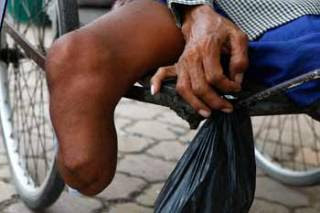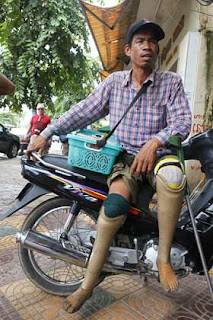 DISCRIMINATION and poor education are among the factors preventing land mine victims from finding jobs, depriving many of access to basic necessities such as food, water and housing, according to a new survey of land mine survivors.
DISCRIMINATION and poor education are among the factors preventing land mine victims from finding jobs, depriving many of access to basic necessities such as food, water and housing, according to a new survey of land mine survivors.Nearly three-quarters of survey respondents said they believed land mine survivors were the last to be chosen for jobs, according to a report on the findings from Handicap International titled "Voices from the Ground: Landmine and Explosive Remnants of War Survivors Speak Out on Victim Assistance".
The report, released Wednesday, was tied to the launch of a campaign calling on an upcoming mine action conference to increase assistance to amputees and other land mine survivors. At that conference, to be held in Cartagena, Colombia, Cambodia will present its national strategy for clearing all antipersonnel mines, a requirement under the 1997 Ottawa Treaty.
Whereas Cambodia has made marked improvements in the medical care and physical rehabilitation of land mine survivors, economic integration and employment opportunities are still lagging, according to the report, which drew on the responses of 78 survivors.
Chhay Sorn, a 47-year-old land mine survivor, said in an interview Thursday that the bleak job outlook prompted him to move from his native Kandal province to Phnom Penh five years ago. He now earns between US$1 and $2 each day begging money from tourists on Sisowath Quay.
He said he was injured in a land mine explosion in Pailin while fighting the Khmer Rouge in 1981. After he recovered, an NGO trained him to make artificial legs and wheelchairs, he said, but the money he was able to earn with that training was insufficient, even though he was unmarried and had no children.
"It was very difficult for me to find a job because there is discrimination against crippled men in this society," he said.
More than two-thirds of respondents said they believed economic reintegration opportunities had not improved since 2005, according to the report.
Only 17 percent said they had seen some improvement. But the report noted some progress on the discrimination front: 73 percent said they believed educational and professional discrimination had decreased.
 Thong Vinol, executive director of the Disability Action Council, said Thursday that he had also seen a decrease in discrimination, adding that disability legislation adopted and approved earlier this year would be "a key instrument" in reducing it further.
Thong Vinol, executive director of the Disability Action Council, said Thursday that he had also seen a decrease in discrimination, adding that disability legislation adopted and approved earlier this year would be "a key instrument" in reducing it further. That said, the survey found that discriminatory hiring policies remained in place in government schools, and that the Ministry of Social Affairs, Veterans and Youth Rehabilitation continued to insist that job applicants be "able-bodied".
Officials from the ministries could not be reached for comment Thursday. The report noted that the Education Ministry was "revising its policies".
The survey yielded a particularly dismal assessment of the government pension system, with delayed payments and bribery among the issues reported.
The report warned several times that Cambodia's dependence on external support for disability services might not be sustainable: "Donor fatigue and prospects of reduced aid were considered as challenges to continuing the current level of service provision.
"Heng Ratana, director general of the Cambodian Mine Action Centre, said he had not seen the report, but that Cambodia had "limited resources" and would need to rely on external support for the foreseeable future.
This view was echoed by Chum Bunrong, secretary general of the Cambodian Mine Action and Victims Assistance Authority. "Cambodia is poor.

